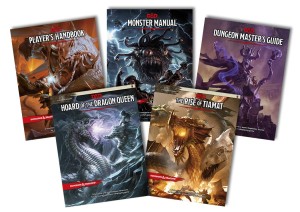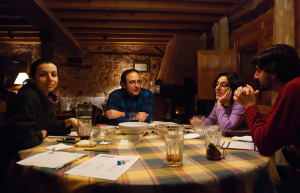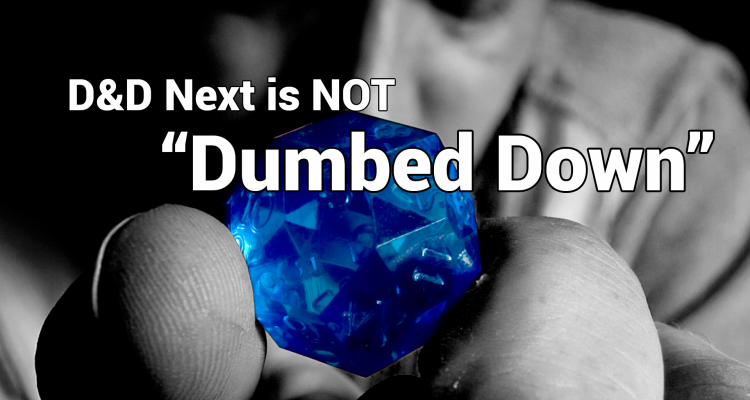We here at Nerd Sourced have our ears close to the ground when it comes to current events in the D&D world. The genesis of this site was largely designed around the release of our most played RPG system, D&D. So far, we love the new edition of Dungeons & Dragons, and we certainly aren’t the only ones.
Unfortunately for our mental well being, we’re also aware of the D&D ‘edition wars,’ though we don’t participate in them. Our team has enjoyed everything D&D has offered us in the past 15 years that we’ve played.
 This article isn’t about us, though. It’s about what we’ve heard since the new Players Handbook was published. There were bound to be complaints about it, of course, as there are bound to be complaints about any product –since, after all, no single product can (nor should) please everyone. We know this is how competition thrives, on the shortcomings and oversights of opponents.
This article isn’t about us, though. It’s about what we’ve heard since the new Players Handbook was published. There were bound to be complaints about it, of course, as there are bound to be complaints about any product –since, after all, no single product can (nor should) please everyone. We know this is how competition thrives, on the shortcomings and oversights of opponents.
There is one common complaint that I hear much too frequently, though, and this complaint doesn’t deserve the legitimacy that comes with the attention it receives.
Which complaint drives me crazy every time it rears it’s ugly head? That the 5th edition of Dungeons & Dragons is “dumbed-down.” Normally, I would avoid making such a flame-baiting observation, but one of the core values of Nerd Sourced is to make games like D&D more accessible to new players. We want to welcome and foster a new generation of adventurers who will grow within the community, and such elitist attitudes and complaints are an attack on what we stand for.
“Games give you a chance to excel, and if you’re playing in good company, you don’t even mind if you lose because you had the enjoyment of the company during the course of the game.”
– Gary Gygax
Simplified Rules Lead to More Time
Indeed the rules for D&D 5e have been simplified, compared to previous editions, but that doesn’t mean they’re dumbed-down. Their simplification makes them better for people who want to spend time and energy playing the game, instead of analyzing the rule books.
In life, time is our most precious resource. Unlike other resources that may come and go, time only goes, and never comes back. Simplified rules will allow players and DMs to use this precious resource where it matters most; to have fun! With the countless conditional modifiers and rules in prior editions, much time was wasted on researching to identify every last one. When you include the brain power needed to remember when or how to apply all of these, you begin to wonder where the fun fits in.
Wizards of the Coast identified the usefulness of such a system -which is absolutely none- and decided to get rid of as many of the silly rules as possible. The result is a cleaner, crisper gaming system with rules that matter, and which enables players to play more and have to read, research, and remember less.
 Easier Rules Lead to More Players
Easier Rules Lead to More Players
I am starting a campaign with nearly all brand new players. They are very smart people (on paths to PhDs as a matter of fact), and the general reaction I received when I showed them the books was “Are we gonna have homework for this?”
If this was any of the prior editions of D&D, I would have had to think of a response about having to grasp certain mechanics, like powers or base attack bonuses. I’d have to word it in such a way so that it wouldn’t come off as a chore they would have to fit into their already busy schedules.
This is D&D Next, though, so my answer was simply “Nope, just think of a cool character to make!” I can get away with this because the rules have become so simple that I can easily teach them while we play. I’ve heard more than one person say that D&D looks very involved, which is not necessarily a good thing for a PhD student to take on. Luckily, I can reassure them with confidence that it’s actually a pretty simple game once it gets going.
 More Consumers Means a Better Product
More Consumers Means a Better Product
First and foremost, Wizards of the Coast is a business. They sell products, and products require a market. This means that with every iteration of D&D, they have to expand their audience, because as the rules of business dictate: it’s sink or swim. Companies cannot stagnate, they must grow in order to ensure ongoing success.
How can you break the stigma of Dungeons & Dragons and make it more accessible to new customers? You make it easier to play.
A stagnant market is the easiest way to get left behind by competitors, so it’s in the best interest of all D&D players that more people buy Wizards products. How can you break the stigma of Dungeons & Dragons and make it more accessible to new customers? You make it easier to play.
What some people might call dumbing-down, I call good marketing strategy. I would have had serious doubts about trying to recruit new players to D&D 4e –and 3.5 was a mess of it’s own, but with 5e I’ve been able to get three new players, merely a month after it’s launch date.
Dungeons & Dragons Next is not dumbed-down. It’s the game that will extend the community, get new players, and expand the market for more and better D&D products that everyone can enjoy.
What specific rules in D&D 5e will help streamline your D&D sessions for more fun?

